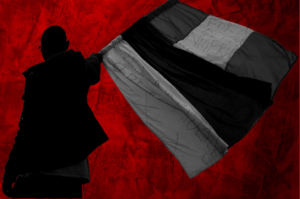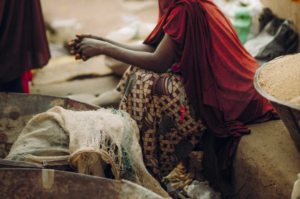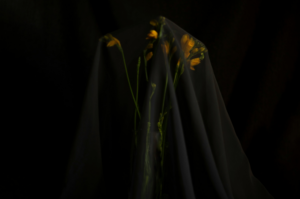On the aft side of the blade, nestled between lilac onion ringlets, lay her finger, a gristled topping.
SHE hadn’t expected to feel the disappointment in her heart when the computer-generated voice from the video game said she had lost. It said it over and over, the letters flashing repeatedly on the TV screen as though to make up for her inability to read. Thembeka didn’t like to lose. She didn’t like it because it left a sawdusty grit in the back of her throat, and it made her want to stick a finger or two into her mouth, like those rail-thin, anorexic white girls who barf out food in her high school’s urine-fouled toilet, choking on the regurgitated curdle in order to be fit for their prom dresses in a week’s time.
But Thembeka wasn’t like those girls, if she was honest. She had known this since she was five or six, playing with street boys and scavenging scrap metals in a disused welder shop to make flimsy cars and planes. Sometimes, they would trot towards the dwarf fruit tree bursting with the heady smell of ripeness to catch flying insects and pluck out their wings. Dissect. Probe. Discard. Until their fingers were numb from the effort, sticky with insect fluid. And, on the days they were feeling extra morbid, they would impale the wingless, writhing bodies of these insects on still-sharp, rust-coated spring head nails and set them on upended box crates, so that they looked like grotesque shrines.
Thembeka gripped the controller now. Nthofeela and Sizwe were sniggering beside her, congratulating themselves on Sizwe soundly trouncing her in Street Fighter, their seventh round of games. Thembeka could feel the sawdust in her throat. They were all sitting on the zebra rug in Sizwe’s kitten-littered flat, upstairs, in the apartment block that Thembeka also lived in, and on the middle floor, where water made gurgling noises through the fat tubular pipe above her window and trickled down like venous blood.
“It’s just a game,” Nthofeela said, smiling.
“Yeah,” she said dryly.
“Cheer up, man,” Sizwe said, stroking the back of a white-tailed kitten that had slithered over his thigh.
“You were lucky.” Thembeka put the control down.
“I was smarter.”
“Ja,” Nthofeela said heartily. He gave Sizwe a loud pat on his back. “Smart guy.”
“He cheated,” Thembeka challenged.
Sizwe glanced at Nthofeela.
“Yes,” Thembeka said. “I was watching—”
“Beka!” Her mother’s voice came floating from the middle balcony. “Your Aunty Rhoda is here!”
Thembeka didn’t move.
“Thembeka?” her mother called again. “Thembeka! Maak vinnig!”
“You better go,” Nthofeela said, still smiling.
Thembeka rose and touched the skull-patterned bandana on her head. She was thinking about Nthofeela’s smile; it was the same smile he had given her earlier, when they were alone in the room and he asked if he could touch her breasts. For a girl of fifteen, her breasts were normal-sized breasts. Maybe a little bit plump, if you factor in puberty. So she had obliged him, watching him as he moved his hand tentatively over each orb, then confidently and urgently, his fingertips brushing her areolas and causing her to feel an arousal that she never thought she could—
“Beka!” her mother shouted.
Thembeka swung away from Nthofeela and Sizwe, hitching up her baggy chinos with a chain looped by the side. She negotiated her way round a languorous spread of snoozing kittens — she almost stepped on one — and hopped out of the sitting room through the open double doors. She held the railing and stared down.
“Coming!” she shouted.
AUNTY Rhoda had been married three times. And this wasn’t because she had been divorced but because all her husbands had died, tragically, and with each death the rumour flared, the rumour that she was a blood-sucking, husband-killing witch. But she never paid attention to the rumour, never let the gossip get to her. Maybe because, Thembeka thought as she stepped off the exterior staircase and moved into their flat, she had a thick skin — in the literal sense. Aunty Rhoda was fat — plump-cheeked, robust arms, overhanging layers of abdominal fat that flopped when she moved. She was huge. Her sister, Thembeka’s mother, was like a midget to her.
Thembeka had a distinct sympathy for Aunty Rhoda and her situation, the bleak condition of marrying and getting widowed with no child to show, but then, on balance, Thembeka didn’t like her that much. The problem was, Aunty Rhoda had always been on this solitary crusade in making Thembeka act like a girl: dragging her to the kitchen to cook; snapping at her in public places to close her legs; dumping girly dresses on her bed and thrashing out the boyish ones in black bin bags; explaining to her that no man would marry her if she kept on with her tomboyish behaviour.
“But that’s the way I am!” Thembeka had shouted. She was thirteen then, frothy with teenage rebellion.
“It’s for your own good!” Aunty Rhoda shouted back.
Thembeka stared at her, saying nothing. She said nothing to her now when Aunty Rhoda, beached upon an armchair and eating grilled corn, asked her if she was going to wear a dress for prom. Her mother, who was unloading the things Aunty Rhoda had brought from a grocery bag, her back bent, said, “She can wear whatever she likes.”
Aunty Rhoda bit into the corn.
“Can she?” she said, chewing.
“Well, it’s up to her.”
“Her friends, won’t they laugh at her if she shows up wearing a suit and tie?”
“I’m not going,” Thembeka said.
Aunty Rhoda stopped chewing. Her mother straightened, holding two packs of rooibos tea.
“Why?” Aunty Rhoda didn’t look at her when she asked this. She was removing bits of corn from her teeth.
“I don’t have a date,” Thembeka said.
There was a tiny pause. Then Aunty Rhoda said, almost idly, “I’m hungry.”
Her mother bent over again and put the rooibos aside, and then took out a perspiring cellophane bag.
“This smells like chicken.”
“It’s chicken,” Aunty Rhoda shifted on the chair. She looked at Thembeka. “And we are going to cook it together.”
***
AUNTY Rhoda, wearing an apron with the strings buried under a fold of waist fat, was chopping a large onion with a knife close to the sink, under which a bowl of half-submerged full chicken sat in a plume of defrosting. Thembeka was about five feet away from her, leaning against the counter and grating nutmeg into a two-day old pot of fish broth because Aunty Rhoda said it would restore the flavour.
“You are not doing it well,” Aunty Rhoda said.
“It’s just nutmeg.”
“Do it well.”
“I’m doing it.” Thembeka added effort to the grating. “Nobody is even going to eat it.”
“I will eat it,” Aunty Rhoda said.
“Of course,” Thembeka murmured.
“I have found a new man,” Aunty Rhoda said after a while. “He’s a new teacher in our school. Very attractive fine man.”
Thembeka stopped grating.
“I think I like him,” Aunty Rhoda said.
“Has he been married before?”
“No.”
“Does he—.” Thembeka stopped. Then she said, “Does he like you?”
“Yes.” There was a glint in Aunty Rhoda’s eyes.
“Oh. Then I’m happy for you.”
“I’m happy for me too,” Aunty Rhoda said, chopping faster. “All the students are already thinking of us as a couple and I really don’t mind. His name is Oscar Matthews.”
Thembeka was staring at the onion she was chopping.
“Oscar is a fine name,” she said distractedly.
“It is. It’s refreshing.”
“Yes.”
“I think it’s a sign of good things to come,” Aunty Rhoda said, chopping ever faster, “You know what they have always said about me.”
Thembeka wasn’t listening. She was entranced by her aunt’s blurring fist, each chop feeding a staccato beat.
“But I don’t want to rush him into anything,” Aunty Rhoda went on. “I shouldn’t rush.”
“Aunty—”
“Because if I rush—”
“Aunty Rhoda—”
“Oscar—”
“Stop please—”
The knife groaned, its blade cutting with a dull thwack. Thembeka gaped. Aunty Rhoda looked down, blinked twice and let go of the knife. On the aft side of the blade, nestled between lilac onion ringlets, lay her finger, a gristled topping. The end of her finger had a puree of blood, still spurting. Immobilised with shock Thembeka stared, waiting for something, anything that she could interpret as permission to panic. Aunty Rhoda slowly raised her maimed hand, and turned it in the light.
“Get me that napkin behind you,” she said calmly.
Thembeka swivelled, dropping the grater. The side wall of the kitchen had pots and frying pans hung on a wooden bar, and on one pan a napkin was draped clumsily over it, one edge flagging over. Thembeka grabbed it, discovered that it was hooked to the nail, and yanked it off, opening a gash in the fabric. When she turned, napkin in hand, she was shocked to see that Aunty Rhoda was back to chopping her onion, almost merrily, the knife clip-chopping on the board. There was no blood. Not even a trace of it anywhere. The chopped finger had vanished. Or rather, it had glued itself back to Aunty Rhoda’s hand.
Thembeka gaped again.
“Where is the blood?” she said loudly. She took a step forward. “Where did it go?”
Aunty Rhoda pushed the onion ringlets aside and looked at her. “What blood?”
“The blood,” Thembeka said in disbelief. “Your blood. You told me to get this napkin for you and now it’s gone.”
“What are you saying?”
Thembeka took another step and studied Aunty Rhoda’s left hand.
“Your finger.”
Aunty Rhoda gave her hand the merest of glances.
“You chopped it off. I saw—”
“Thembeka,” Aunty Rhoda said sharply. “Have you been smoking dagga with those boys upstairs?”
“No!” Thembeka shouted.
“Tell me the truth.”
“I’m not smoking!”
“It will be our secret.”
“Your finger,” Thembeka said, still staring at Aunty Rhoda’s hand, “But how?”
Aunty Rhoda set the knife down and took out the thawing chicken from the bowl.
“You saw nothing.”
“I know what I saw,” Thembeka whispered in defiance.
Aunty Rhoda raised the knife and buried it in the chicken’s gut with a murderous swoop.
“You saw nothing, child,” she said.
***
IN the middle of dinner, Thembeka excused herself and lied to her mother that she had had her fill and that she wanted to do some reading before going to bed. Just inches away from the table she caught Aunty Rhoda’s eye, a hooded gaze that seemed to convey a mild curiosity. In her bedroom, half-lying on the bed with her feet sheathed in big purple socks, Thembeka couldn’t stop herself from thinking about the mysterious event of the day, the chopping off of Aunty Rhoda’s finger. And the blood. She was bludgeoned by a sledgehammer of confusion.
Telling her mother about Aunty Rhoda would be pointless because there was no way to prove that the incident occurred, and besides, it would only cast Thembeka in the bad light of juvenile instability and mischievousness. And, more to the point, reinforce whatever private convictions her mother had about Thembeka’s developing personality, her natural affinity for boyness.
Thembeka knew what she saw in the kitchen, and what was difficult for her was that she didn’t want to listen to that small voice in her head, the voice telling her that rumour about Aunty Rhoda being a witch. She wanted to silence it, not just for Aunty Rhoda’s sake, but for her own sake. The pipe outside her window was gurgling now. She slid further down on the bed, removed the pillow wedged under her back, and held it close to her chest. Then she twisted and reached for the bedside lamp and switched it off.
Later, she was awakened by something moving on the bed, slow enough to felt deliberate and rhythmic. She raised her head a fraction and squinted in the darkness. She couldn’t pinpoint the direction of the movement but she felt it, a phantom twitching. She shifted towards the bedside lamp and groped for the switch, found it, and switched it on. With her vision dazzling from the light, she glimpsed the finger: four-inches long, pudgy-knuckled with a grisly skirt of torn muscle and cartilage. It was slithering on the pillow above her chest, filigreed with blood. A shudder went through it, starting from the tip of the nail, travelling down its length. The finger stilled and then it straightened slowly, leaving a red whorly print on the pillow. Her mouth widened but no sound came out. Her larynx wouldn’t obey. The finger spasmed violently, riveting her in place. Then it twitched and shot in the air and slammed into the roof of her mouth. Thembeka retched, torn ligaments wiggling and burrowing in, edging for her throat. She couldn’t swallow. She couldn’t breathe. Then the finger went limp and she heard a quiet disembodied chuckling beside her ear.
“You saw nothing.”
And for the first time in ages, Thembeka screamed like a girl.
************
Image by Jay Trevor via Flickr.
About the Author:
Bernard Dayo is a speculative fiction writer and a fashion designer. His first novel, The Year of the Space Mission, is yet to be published and he is currently working on his second. You can follow him on Twitter: @BernardDayo










Joe Aito December 04, 2016 11:15
Hahaha.... Well done, Dayo.